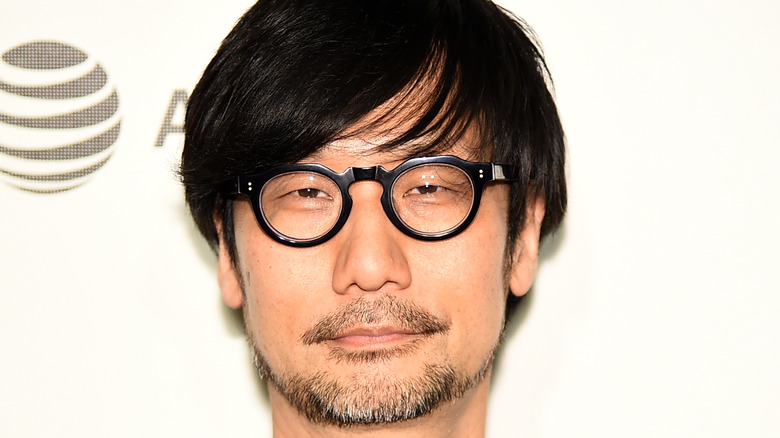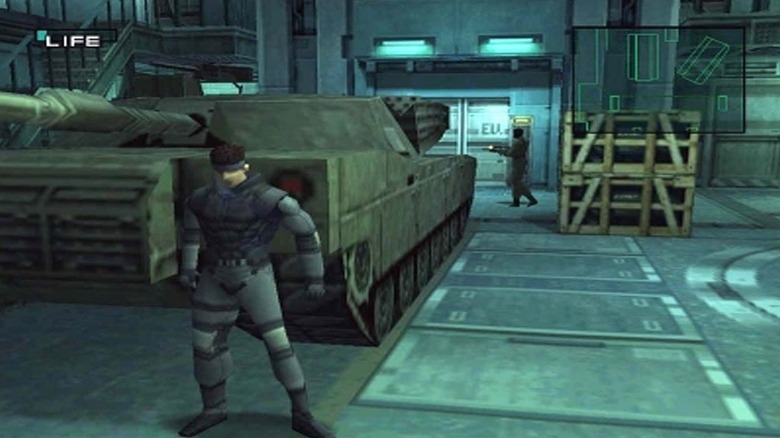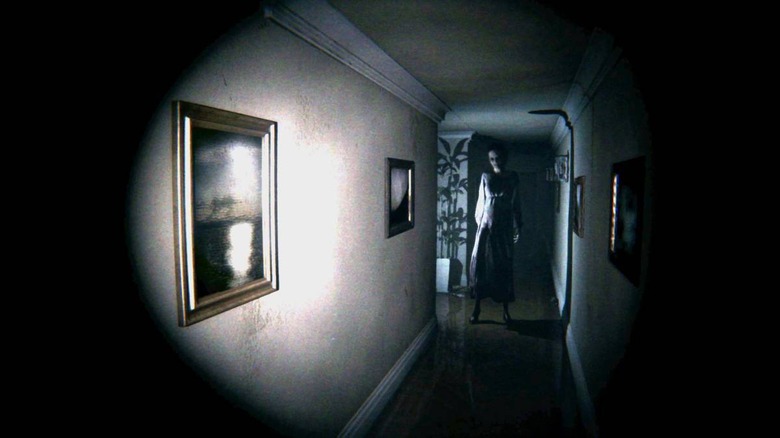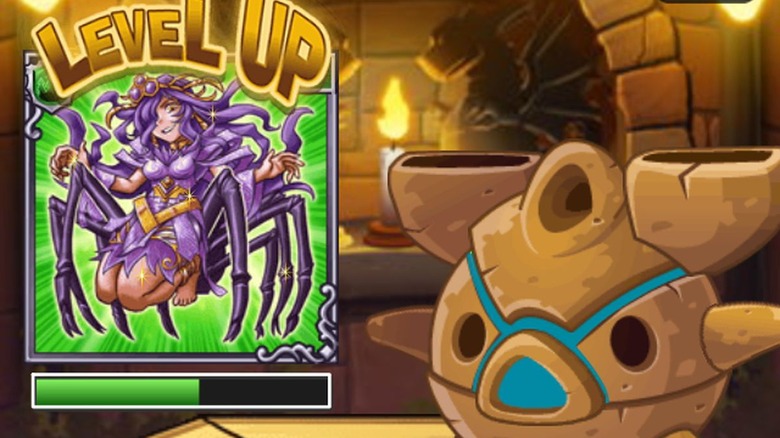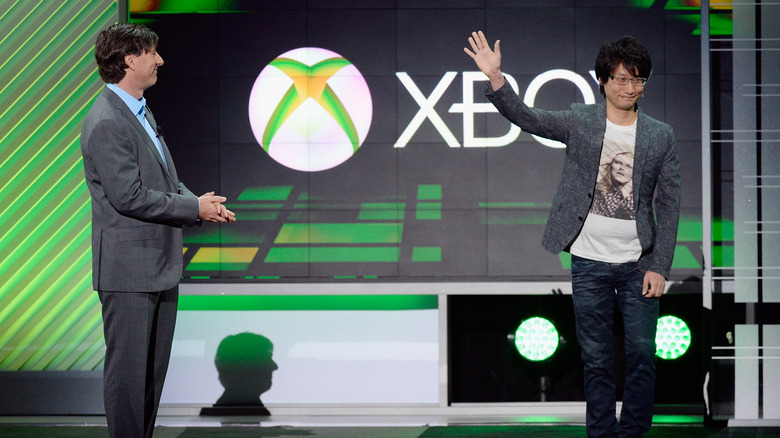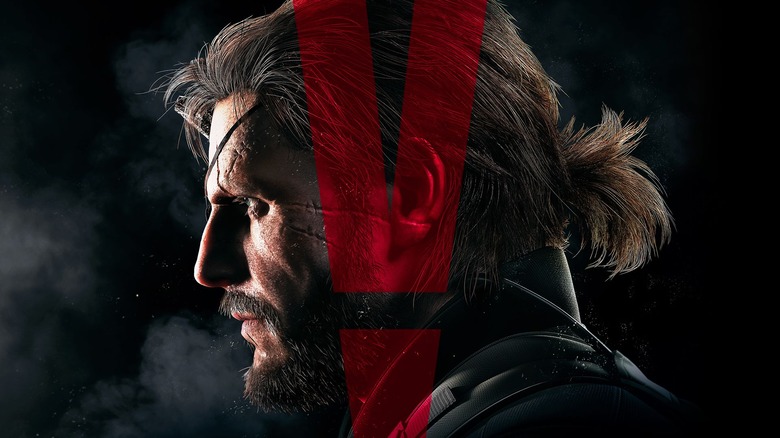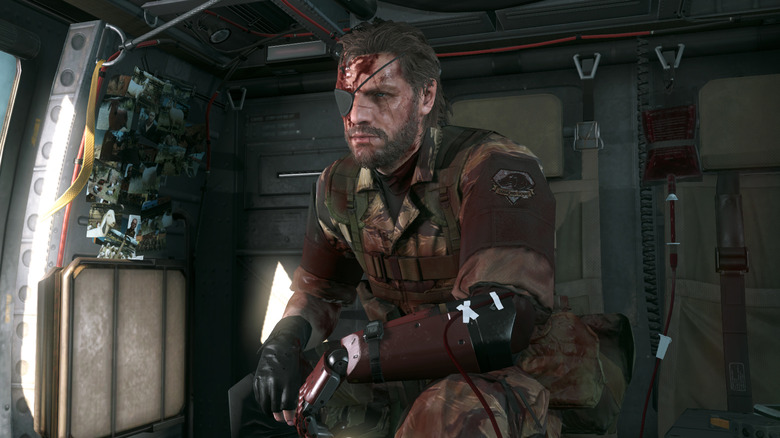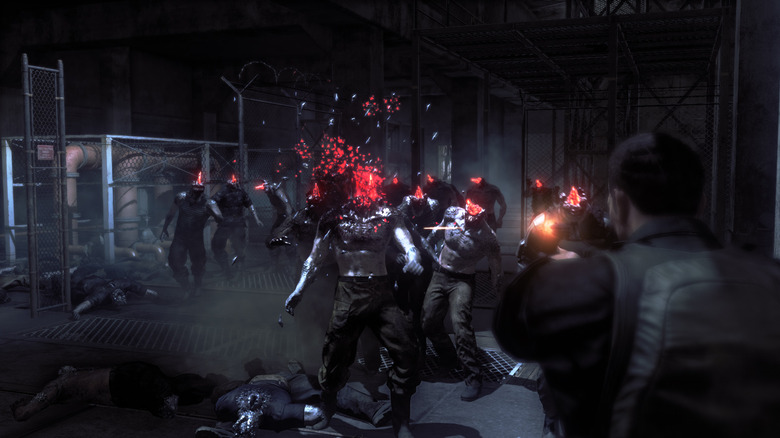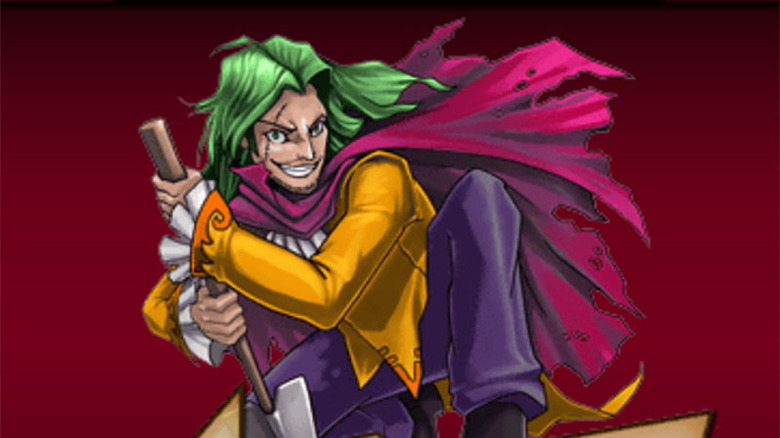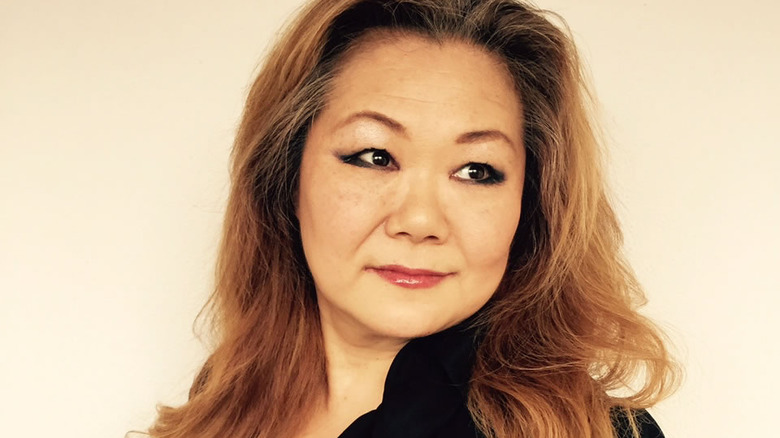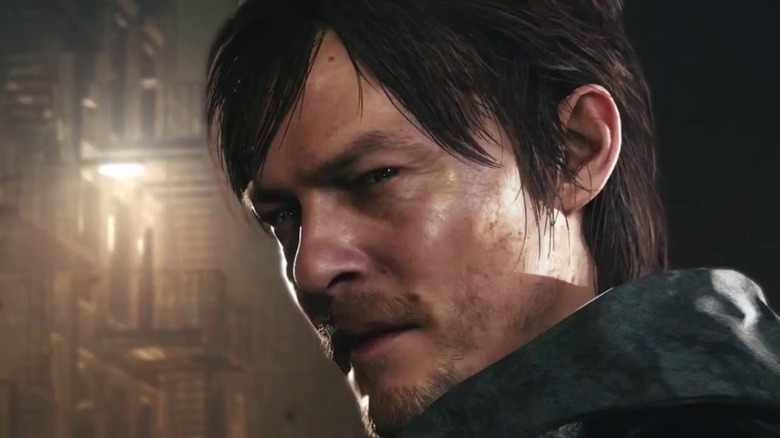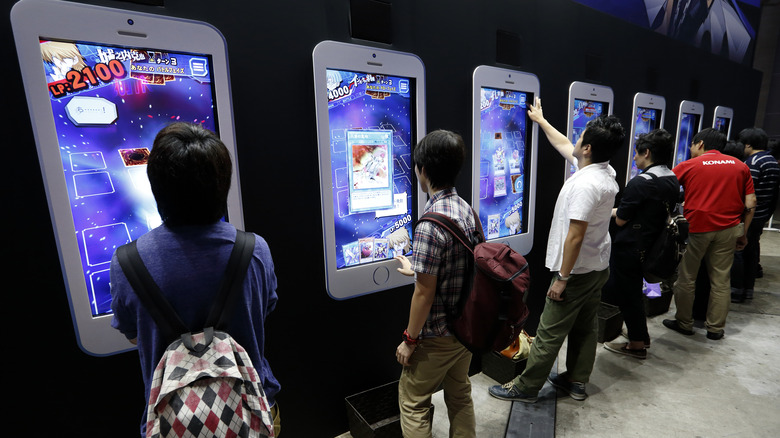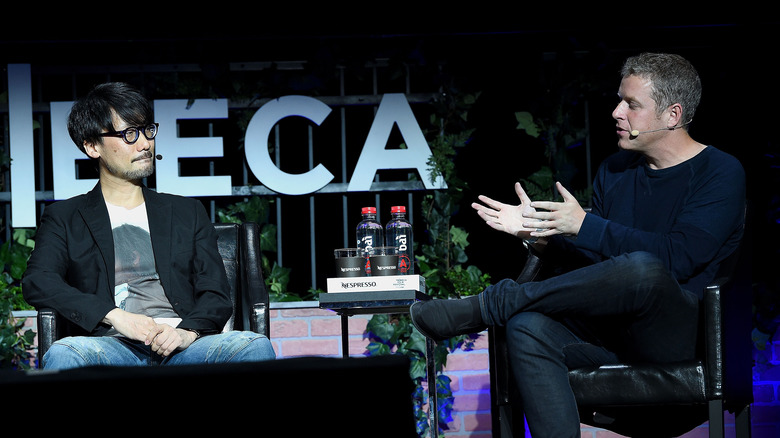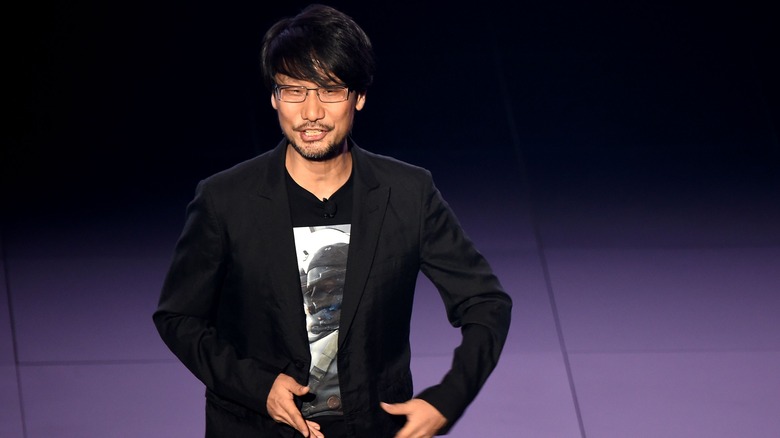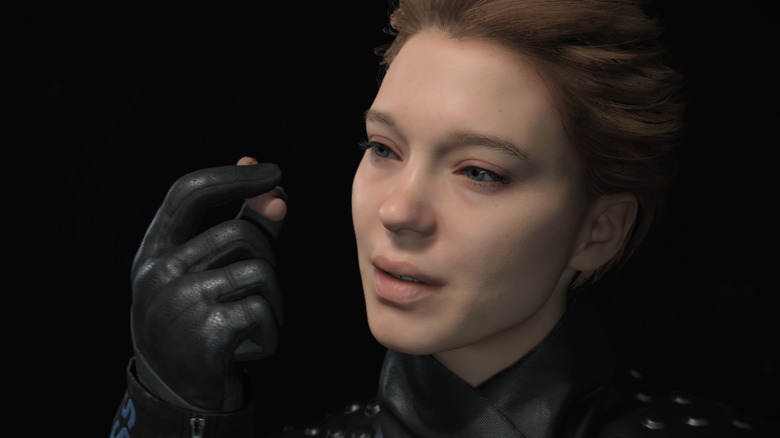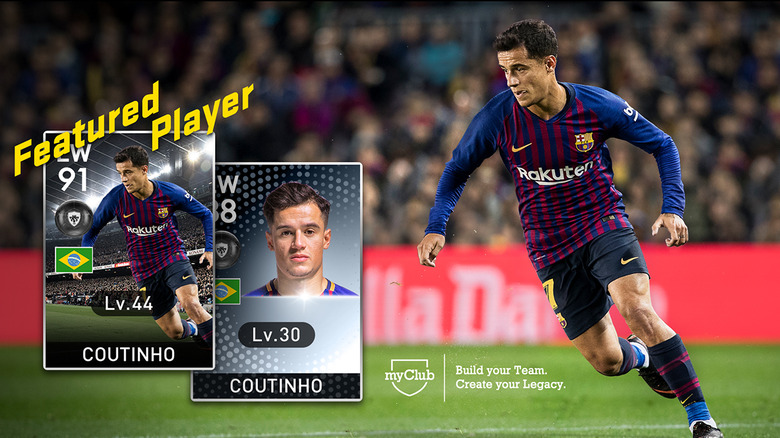The Truth Behind Konami And Kojima's Split
The Metal Gear franchise is famous for its twisty, complicated plotlines, but the best tale that the franchise ever spawned doesn't have anything to do with clones, nanobots, or giant mechs. It's the very real story of how the man behind Metal Gear, Hideo Kojima, broke up with his publisher, Konami, where he'd worked for the better part of 30 years. It's a tragedy full of murky and sinister motives, some very shifty behavior, more than one backstabbing, and all kinds of backroom deals — and, amazingly, it's all true.
Neither Konami nor Kojima have ever come out and said exactly what went down, but by this point, we have enough evidence to put the pieces together ourselves. And so, we have. Here is the story of how one of the most famous game developers in history fell from grace and was punished by a powerful, vindictive company. Sit down for this one. It's a doozy.
The early years
Hideo Kojima and Konami go way, way back. Kojima joined the company in 1986, after Super Mario Bros. inspired him to devote his life to making video games. Instead of Konami's Famicom team, however, Kojima was put to work making games for the MSX, a home PC that was popular in Japan. His first game as a designer, a plot-heavy platformer called Lost Warld, was cancelled early in production, and Kojima took over an action title called Metal Gear from a co-worker.
You probably know what happened next. In order to account for the MSX's shortcomings — only a couple of enemies could appear on screen at a time, for example — Kojima focused the action on stealth, not combat, inventing a whole genre in the process. Metal Gear was a success, and Kojima made a sequel, in addition to the narrative adventure games Snatcher and Policenauts.
In 1998, Kojima released Metal Gear Solid for the PlayStation. It changed everything. Metal Gear Solid's cinematic storytelling and unique, stealth-based gameplay led many critics to crown it the best video game of all time. Kojima became an international superstar, and Metal Gear became Konami's flagship franchise. Many successful sequels followed.
Riding high
By 2014, Konami's and Kojima's fates seemed inextricably connected. Kojima held the title of Konami's Executive Content Officer, meaning that he had a say in every game it produced. Metal Gear Solid 5: Ground Zeroes launched that year to rave reviews; Metal Gear Solid 5: The Phantom Pain was well into development.
In addition, in summer 2014, a mysterious game called P.T. arrived on the PlayStation store. It immediately took the internet by storm. After players worked their way through P.T.'s looping corridor, which was filled with both spooky puzzles and jump scares, they learned that P.T. stood for "playable teaser." And what was it teasing? Why, nothing less than a Silent Hill reboot co-directed by Kojima and the Oscar-nominated director of Pan's Labyrinth, Guillermo del Toro.
Given how much Kojima was inspired by Hollywood films, it seemed like a match made in heaven, and Kojima's future looked bright. Spoiler: it didn't last.
The landscape shifts
To truly understand why Kojima and Konami broke up, you have to go back to 2010, when Konami launched one of its biggest successes. It's called Dragon Collection, and it changed everything.
While Konami had built its name on hardcore arcade and console titles like Metal Gear Solid, Castlevania, Frogger, and Contra, Dragon Collection was a casual card-collecting game that ran on social networks (and, soon thereafter, mobile phones). Its controls were basic — early smartphones couldn't handle much input — and while Dragon Collection had some RPG-like elements, its card-based mechanics were simple enough that almost anyone could pick it up pretty easily.
And they did. Before long, millions of people in Japan were playing Dragon Collection. It wasn't just a hit: it was a sensation, and many copycats followed. Even better, at least from Konami's point of view? Dragon Collection was cheap to make, and it brought in a ton of cash. Konami's executives realized that they didn't need to make lavish AAA games to turn a profit. For better or for worse, inexpensive mobile titles would work just fine.
It begins
In early 2015, Kojima announced that Metal Gear Solid 5: The Phantom Pain would arrive on consoles and PCs the following September. Fans rejoiced. Around the same time, however, the tide began to change — and nobody noticed until it was too late.
In March 2015, Konami announced that it would undergo a corporate restructuring in which the company would move from a studio-based model, in which individual developers were responsible for their own projects, to a "a headquarters-controlled system" that put the corporation in charge. The next day, it also unveiled a brand new executive board. Surprisingly, Kojima wasn't mentioned in either press release.
With the benefit of hindsight, it's obvious what was happening. During the shuffle, Kojima lost his Executive Content Officer title. His studio, Kojima Productions, was suddenly just another cog in Konami's corporate machine. The Kojima-Konami split had begun. While it wasn't clear then, it would be just a few days later.
Kojima no more
Hideo Kojima has always been inspired by blockbuster films — Metal Gear was influenced by The Great Escape, for example — and as a designer, he often treats himself like a Hollywood director. As such, his name is all over the Metal Gear games. Why shouldn't it be? Kojima is one of the few game developers who's a household name, and his involvement in a title is a big marketing point. It's in everyone's best interest to put his personal branding front and center.
That's how people knew that something was afoot. On March 16, 2015, the same day that Konami's restructuring took effect, Konami removed Kojima's name from everything it controlled. He was scrubbed from the Metal Gear Solid 5 website and all related marketing materials. His US-based studio, Kojima Productions Los Angeles, was renamed Konami Los Angeles Studio.
People caught on quickly, and started to wonder if Kojima and Konami were done. A few days later, the two issued a joint statement confirming that Kojima was still working on MGS5, but did not discuss what would happen after the game's release.There was a good reason for that: as far as Kojima's future at Konami was concerned, he didn't have one.
The break-up becomes official
The same day that Konami and Kojima released their statement, GameSpot ran a report confirming what many had already guessed: Kojima's days at Konami were numbered, thanks to unspecified "fallout" between the two. The famed game designer would leave the company shortly after the release of Metal Gear Solid 5, ending a three-decade relationship.
The article didn't stop there. In addition to losing his job, GameSpot said, Kojima and the rest of his staff had been downgraded from full employees to contractors. Senior staff members were cut off from the rest of the company as Konami limited their access to its email servers, phone lines, and internet service. Finally, Kojima and other producers wouldn't be allowed to promote MGS5, even though Kojima is a celebrity in the video game industry.
Later, we learned that things were actually even worse. For the final six months of MGS5's development, Kojima was "locked in a separate room" and forced to work on a different floor than the rest of his staff, communicating with others via proxy. And yet, somehow, that was only the beginning of the indignities.
Metal Gear grinds ahead
In yet another show of disrespect, Konami made it very clear that it planned to continue the Metal Gear franchise without Kojima at the helm. From a business perspective, that's understandable. It's a big series. Kojima created the Metal Gear franchise and directed all of its major installments, though. His personal style is all over the thing. It's not really Metal Gear without him.
Regardless, at the exact same time that Konami was erasing Kojima's name from its website, taking his executive title, and robbing him of his job, a post on Konami's careers website claimed that a brand new Metal Gear game was already in the works. Given the news (as well as Kojima's previous claims that Metal Gear Solid 5 would be his last), it seemed obvious that Kojima wasn't involved. To be fair, Konami owns Metal Gear, and it can do what it wants with it. Announcing a new Metal Gear while they're in the process of firing its creator, the man who gave it its signature voice, though? That's ice cold.
That "new" game ended up being Metal Gear Survive, by the way. It flopped. Hard.
But why?
Thanks to corporate non-disclosure agreements, we'll probably never get an official reason for why Konami and Kojima split, but it's not hard to connect the dots. In May 2015, Konami's then-new president Hideki Hayakawa confirmed that Konami's main focus would be mobile gaming, not console titles. Console games would still stick around, but they were no longer the company's priority. In fact, by that point, many of Konami's biggest console franchises had already started transitioning to mobile, where they'd been pretty successful.
You can trace this shift back to Dragon Collection. Not only was Dragon Collection Konami's first big mobile hit, but guess who served as its executive producer? Yup, that's right: Hideki Hayakawa. In fact, in an interview with Polygon, Hayakawa claimed that he'd been driving Konami's move into mobile games since summer 2014, when he became Konami's vice president.
Hayakawa also claimed that Konami's old corporate structure made it hard for the company to react to changes — like, say, the rise of mobile gaming. Hence, the corporate restructuring. Whether that was true or not, one thing was very clear: at the new Konami, there was no space for Kojima or the lavish, big-budget games that he makes.
Enough blame to go around
On the other hand, maybe — just maybe — this feud isn't entirely Konami's fault. Some evidence indicates that Kojima shoulders some of the blame, too.
In an interview, Metal Gear Solid composer Rika Muranaka revealed that Kojima isn't all that easy to work with. He'd often pay Muranaka to write songs, only to reject them once she delivered a finished product. According to Muranaka, that was par for the course. As Muranaka tells the story, Kojima refused to cut corners during game development, and spent lots of money adding extra features to Metal Gear Solid 5, delaying the game. Because Kojima worked on a salary, the ever-increasing budget and numerous delays didn't affect him, but they did affect Konami's bottom line. Ultimately, that tension ruined their relationship.
That all adds up. Kojima has admitted that he's not interested in the business side of game development, and given his perfectionist streak, it wouldn't be shocking if he went over-budget. Kojima is a master designer, but he's not a great businessman — and it ended up costing him.
The hills go silent
Whatever caused the rift between Kojima and Konami, Metal Gear wasn't the only casualty. The big blow-up hurt Silent Hills, too. About a month after Kojima and Konami took a one-way trip to Splitsville, P.T. disappeared from the PlayStation store. Fans feared the worst.
They were right to worry. When guests at a film festival asked Guillermo del Toro about Silent Hills the following weekend, del Toro answered, "It's not gonna happen and that breaks my greasy heart." Norman Reedus, Silent Hills' star, expressed similar regrets on Twitter. "Super bummed about this was really looking forward to it," Reedus wrote. "Sorry everyone."
A day later, Konami confirmed what everyone already knew: Silent Hills was dead, and it wasn't coming back. Even P.T., which is still considered one of the best horror games ever made, is lost to time. Even if you played it in 2014, you can't re-download it to your PlayStation 4, and if you haven't ever experienced it, a PS4 with P.T. installed will cost you over $1,000. Now that's scary.
It's not just Kojima
Setting aside whose fault the entire Kojima fiasco was, it's clear that Konami disrespected and mistreated the game designer. However, while Kojima might've been Konami's highest-profile victim, he wasn't its only one. In its rush to capitalize on the mobile gold rush, Konami transformed its workplace into a dystopian nightmare and started treating its employees "like prisoners" in order to maximize profits.
According to a report from the Japanese newspaper Nikkei (helpfully summarized in English by Kotaku), Konami publicly shames workers who take long lunch breaks. It monitors its employees' social media feeds and punishes people who "like" things that could be construed as anti-Konami. Nobody has a permanent email address in order to keep recruiters at bay, security cameras monitor employees instead of intruders, and developers — including high-profile producers — are reassigned to menial jobs if Konami decides that they're not "useful."
Even if only part of that report is true, it paints a pretty dire picture of what life is like at Konami, and it's easy to imagine a company like that treating its biggest star like dirt. Maybe it's a good thing that Kojima left Konami. It doesn't sound like a great place to work.
Konami holds a grudge
Metal Gear Solid 5: The Phantom Pain came out in September 2015. Naturally, it was a hit. Kojima said goodbye to his staff during a farewell party in October, and from all indications, his contract with Konami was set to expire in December.
That should've been the end. It wasn't, not by a long shot. On December 3, 2015, The Phantom Pain won the Best Action/Adventure Game trophy at Geoff Keighley's The Game Awards, but Kojima wasn't on-hand to accept it (MGS5 star Kiefer Sutherland appeared in his stead). Keighley took a brief moment during the ceremony to explain why. "Mr. Kojima had every intention of being with us tonight," Keighley said, "but unfortunately he was informed by a lawyer representing Konami ... that he would not be allowed to travel to tonight's award ceremony."
Thankfully, Kojima gained his freedom just a few days later. Kojima's contract with Konami expired on December 15, but do you really think it ended there? Yeah, we didn't either.
Kojima strikes back — and Konami retaliates
Throughout this whole ordeal, Hideo Kojima stayed out of the public eye, letting the media tell the story. In 2016, however, Kojima made a rare dig at his former employer. While visiting the Tokyo Game Show to promote his first post-Konami game, someone asked Kojima about Metal Gear Survive, which builds on Metal Gear Solid 5's foundation and introduces zombies to the franchise.
Kojima's response wasn't diplomatic. "It's totally unrelated to me," Kojima said, before going on to trash Metal Gear Survive's entire premise. "Metal [Gear] is espionage with political fiction," Kojima said. "So, because of that, there's no reason that zombies would show up." Naturally, Konami wasn't pleased. Konami executives couldn't fire Kojima — they'd already done that — but they did chastise him publicly in a letter that accused Kojima of "unfairly sullying the reputation of our company."
Reports also indicated that Konami wasn't paying Kojima money that he was due, that it was warning other companies not to hire former Kojima Productions staffers, and that it was making it hard for the new Kojima Productions studio to get its members health insurance. In other words, don't cross Konami. It doesn't play around.
Miraculously, a happy ending
Getting dumped is never fun, and Kojima took Konami's rejection pretty hard. "I thought I had lost everything," Kojima admitted during a big press event. "I was creating games for 30 years ... but I had nothing to start with ... No office, no staff, no materials or things to work on, no machines."
As it turns out, however, Kojima wasn't alone. Thanks to his Hollywood connections, including friends like Guillermo del Toro, Norman Reedus, and Geoff Keighley, Kojima was back on his feet in months. The day after leaving Konami, Kojima announced that he was opening a brand new Kojima Productions studio, and that he'd already made a deal with Sony to distribute his games. His first game as a free man, Death Stranding, was announced at E3 2016, and is set to release Nov. 8, 2019.
It has a packed cast, too, including Reedus; del Toro; Hannibal, Rogue One, and Casino Royale star Mads Mikkelsen; Inglorious Basterds actress Léa Seydoux; The Leftovers' Margaret Qualley; and more. From what we've seen so far, Death Stranding is shaping up to be the biggest, weirdest Hideo Kojima joint yet. Fans can't wait to play it.
... for everyone, unfortunately
Here's the hard truth: Konami might've been right — not about publicly humiliating Hideo Kojima and locking him in a closet, unceremoniously firing him, or trying to make Metal Gear without him, of course. That's all vile. However, Konami's shift from expensive console games to small, cheap mobile titles has paid off. Big time.
Fans were never behind Metal Gear Survive, and it performed accordingly at the marketplace. Konami's mobile games, though? Those keep bringing in the cash. In September 2017, two and a half years or so after pivoting towards mobile, Konami reported that revenue was up 28.7%. Profits rose a staggering 40.6% year-on-year. That growth wasn't driven by console titles. It was the result of mobile games like Yu-Gi-Oh! Duel Links and mobile spin-offs of Konami's Pro Evolution Soccer franchise.
For people who enjoy series like Castlevania, Contra, and Metal Gear, that's a bitter pill to swallow. For Kojima's dedicated fans, it's hard to see the company doing so well. Still, corporations aren't in the business of making people happy. They're here to earn money — and for better or worse, Konami has proved to be very, very good at that.

